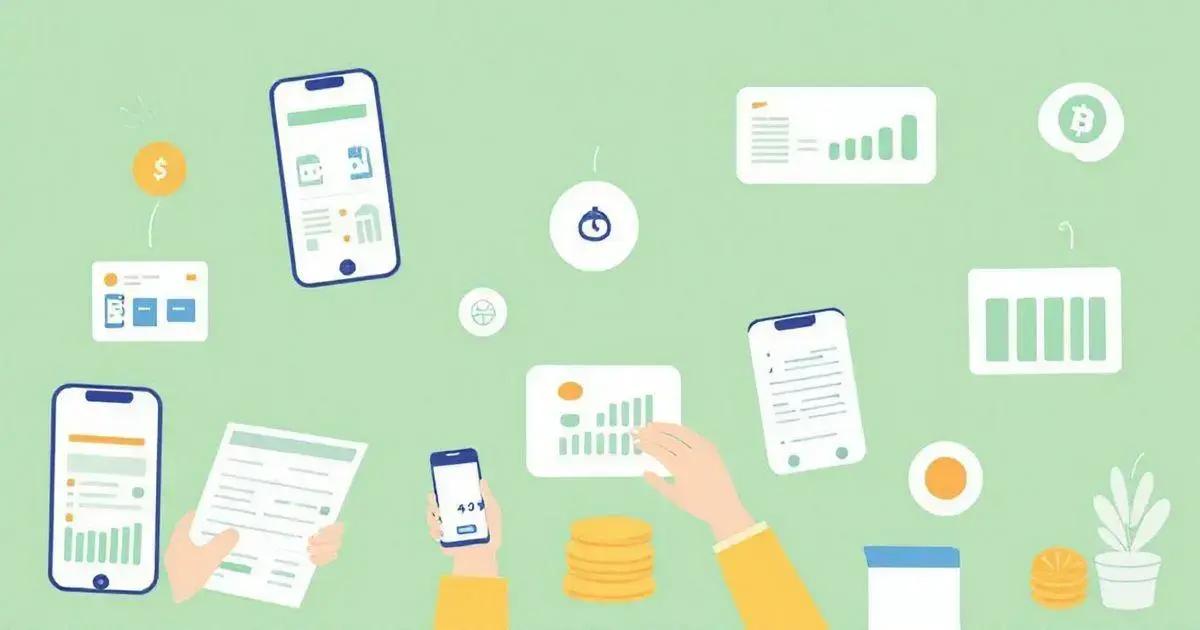In today’s fast-paced world, Personal Finance Management is essential for maintaining financial stability and achieving long-term goals. With the right tools, individuals can automate savings, track expenses, and make more informed financial decisions. Budgeting apps, expense trackers, and investment platforms simplify money management and enhance financial literacy.
Effective Personal Finance Management goes beyond simple budgeting. It involves setting realistic goals, monitoring cash flow, and utilizing digital solutions to optimize spending habits. By integrating technology into financial planning, individuals can create sustainable strategies that align with their lifestyle and future aspirations.
What are the most effective tools for Personal Finance Management, and how can they improve financial well-being? Exploring key resources and best practices can help you take control of your finances and build a more secure future.
Understanding Personal Finance Management
Understanding personal finance management is crucial for anyone looking to take control of their financial future. It involves tracking your income, expenses, savings, and investments. By mastering these elements, you can make informed decisions that enhance your ability to save money effectively.
What is Personal Finance Management?
Personal finance management is the process of budgeting, saving, investing, and planning for future financial goals. It combines all aspects of your financial life and helps you allocate your resources wisely. This ensures you can meet your immediate needs while also preparing for long-term objectives.
Importance of Personal Finance Management
Effective personal finance management allows you to build wealth and avoid debt traps. It gives you a clearer picture of your financial situation and empowers you to make smarter spending decisions. Moreover, understanding your finances helps reduce stress and anxiety about money.
Key Components of Personal Finance
There are several key components that you should focus on:
- Budgeting: Creating a budget helps you track your spending and identify areas where you can cut costs.
- Savings: It’s important to set aside money for emergencies and future expenses. Aim to save at least 10% of your income.
- Investing: Consider various investment options that can help grow your money over time, such as stocks, bonds, or mutual funds.
- Debt Management: Keep track of your debts and work on paying them off systematically to improve your financial health.
Setting Financial Goals
Setting clear financial goals is essential for successful personal finance management. Goals can range from short-term objectives, like saving for a holiday, to long-term ambitions, like buying a house or retirement planning. Ensure your goals are specific, measurable, attainable, relevant, and time-bound (SMART).
Top Digital Tools for Budgeting

When it comes to budgeting, using digital tools can simplify the process and make it more effective. Here are some of the top digital tools for budgeting that can help you manage your finances better:
1. Mint
Mint is a popular budgeting tool that allows you to manage your finances in one place. It connects to your bank accounts and automatically categorises your transactions. You can set budgets, track expenses, and receive alerts when you’re close to overspending.
2. YNAB (You Need A Budget)
YNAB is designed for proactive budgeting. It helps you assign every dollar a purpose, ensuring that all your money is working towards your goals. With YNAB, you can monitor your spending, adjust your budget in real-time, and improve your financial habits.
3. PocketGuard
PocketGuard links to your accounts and shows you how much money you have available to spend. By tracking your income, bills, and expenses, this app gives a clear view of your finances, allowing you to make informed decisions.
4. GoodBudget
GoodBudget is a virtual envelope budgeting system. You allocate money to different envelopes for various spending categories. This approach helps you see how much you have left to spend in each category, making it easier to stick to your budget.
5. EveryDollar
EveryDollar, created by financial guru Dave Ramsey, helps you build a budget from scratch. It has an easy-to-use interface where you can plan your monthly expenses. The basic version is free, while the premium version offers additional features like automatic bank imports.
6. Personal Capital
Personal Capital provides budgeting tools combined with investment tracking. It helps you see your net worth, track your spending, and plan for retirement. Personal Capital is excellent for those interested in both budgeting and investing.
7. Spendee
Spendee offers a visually appealing interface to track your expenses and income. You can create shared wallets for group expenses, making it a perfect tool for managing budgets with friends or family.
These digital tools for budgeting can transform your financial management experience. By selecting the one that best fits your lifestyle, you’ll be better equipped to achieve your financial goals.
Apps for Tracking Expenses Effectively
Tracking your expenses is a vital part of managing your personal finances. Here are some of the top apps for tracking expenses effectively that can simplify the process:
1. Expensify
Expensify is a user-friendly app designed for tracking expenses and managing receipts. It allows you to scan receipts, categorise expenses, and create detailed expense reports. This is especially useful for professionals who need to keep track of business expenses.
2. Wally
Wally is a comprehensive expense tracking app that helps you manage your finances intuitively. You can log your expenses, set budgets, and even scan receipts. Wally offers insights into your spending habits and helps you track your income effectively.
3. Clarity Money
Clarity Money helps you track your expenses by using your bank statements. It categorises your transactions and provides visual charts to analyse your spending. Additionally, the app can help you identify subscriptions you may want to cancel.
4. Personal Capital
While primarily an investment tracking tool, Personal Capital also offers expense tracking features. You can see where your money goes, track spending trends, and monitor your net worth—all in one app.
5. Spendee
Spendee allows you to track expenses with a visually appealing interface. You can create shared wallets for group expenses and set budget limits for each category. Spendee also offers international currency support, making it suitable for travel.
6. Monefy
Monefy keeps expense tracking simple and straightforward. With a clean interface, you can easily add and manage your daily expenses. The app also provides reports and charts to review your financial habits.
7. Zeta
Zeta is great for couples who want to track their joint finances. You can manage shared expenses, set budgets, and monitor your financial goals together. Zeta supports separate and joint budgeting, keeping financial management collaborative.
These apps can significantly improve your ability to track expenses effectively. By choosing one that fits your lifestyle, you can gain better control over your finances and save for your future goals.
How to Automate Your Savings

Automating your savings is a smart way to ensure you put away money regularly without having to think about it. Here’s how you can automate your savings effectively:
1. Set Up Automatic Transfers
Most banks offer the option to set up automatic transfers between accounts. You can schedule transfers from your checking account to a savings account each pay period. This way, a portion of your income goes straight to savings without any effort on your part.
2. Use Savings Apps
There are various apps designed to help you save automatically. Apps like Qapital or Digit can track your spending and save small amounts based on your habits. You set the rules, and the app does the rest, transferring money to your savings account automatically.
3. Take Advantage of Employer Programs
If your employer offers a savings program, such as a retirement plan with automatic deductions, take advantage of it. Contributing automatically to retirement accounts not only helps you save but may also offer tax benefits.
4. Round-Up Savings
Consider using an app that rounds up your purchases to the nearest dollar and saves the difference. For example, if you buy a coffee for $3.50, the app rounds it up to $4.00 and saves the extra $0.50. This method adds up without you having to change your spending habits.
5. Monthly Goals
Set specific monthly savings goals in your banking app. You can automate contributions to different savings goals, like a holiday fund or emergency fund, each month. This helps ensure you are saving towards specific objectives.
6. Savings Accounts with High Interest
Open a high-interest savings account and link it to your checking account. Set up automatic transfers to this account. The higher interest will help your savings grow faster, making your efforts even more rewarding.
7. Regularly Review and Adjust
While automation is convenient, it’s important to review your savings plan regularly. Check whether your automated transfers align with your financial goals. Adjust the amounts or frequency as needed to keep your savings on track.
By automating your savings, you make the process simple and consistent. This way, you can focus on other financial priorities while ensuring that you steadily grow your savings.
Benefits of Using Financial Management Tools

Using financial management tools offers numerous benefits that can significantly enhance your personal finance management. Here are some key advantages:
1. Improved Budgeting
Financial management tools help you create and maintain a budget. By tracking your income and expenses in real-time, you can gain insights into your spending habits and make necessary adjustments.
2. Time Savings
Managing finances manually can be time-consuming. Financial tools automate repetitive tasks such as tracking expenses and generating reports, freeing up your time for other activities.
3. Enhanced Savings
Many tools offer features that encourage saving, such as rounding up expenses or setting up automatic transfers to savings accounts. This can help you save more effortlessly.
4. Better Financial Tracking
With financial management tools, you can easily track various financial accounts, including bank accounts, credit cards, and loans, all in one place. This provides a holistic view of your financial situation.
5. Goal Setting
These tools often come with goal-setting features that let you define short-term and long-term financial objectives. You can track your progress towards these goals and adjust your strategies as necessary.
6. Increased Financial Literacy
Many financial tools provide educational resources and insights that improve your understanding of personal finance. This increased knowledge can help you make informed financial decisions.
7. Security and Peace of Mind
Reputable financial management tools come with robust security features, ensuring that your financial data is safe. Knowing that your information is secure allows you to manage your finances with confidence.
8. Easy Accessibility
Most financial management tools are available as mobile apps or web-based platforms, allowing you to access your financial information anytime, anywhere. This level of accessibility makes it easier to keep track of your finances on the go.
By leveraging these benefits, you can take control of your finances more effectively and work towards your financial goals with confidence.
FAQ – Frequently Asked Questions about Personal Finance Management
What are the key components of personal finance management?
The key components include budgeting, saving, investing, and debt management, all of which are crucial for effective financial planning.
How can digital tools help with budgeting?
Digital tools streamline the budgeting process by tracking expenses, categorising transactions, and providing insights into spending habits.
What are some effective apps for tracking expenses?
Popular apps like Expensify, Wally, and PocketGuard help you track expenses easily and maintain an overview of your financial health.
Why should I automate my savings?
Automating savings ensures that you consistently set aside money for future needs without needing to think about it, promoting a healthier financial habit.
How do I choose the right investment platforms?
Consider your investment goals, the types of investments available, fees, user experience, and the availability of research resources when choosing a platform.
What benefits do financial management tools offer?
These tools improve budgeting, save time, encourage savings, enhance tracking, support goal setting, and increase overall financial literacy.
Check out our article on Investment Advice to discover expert strategies for growing your wealth and making informed financial decisions.
